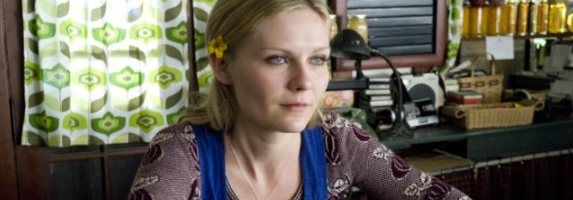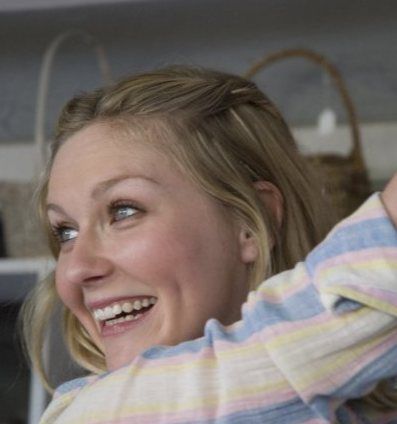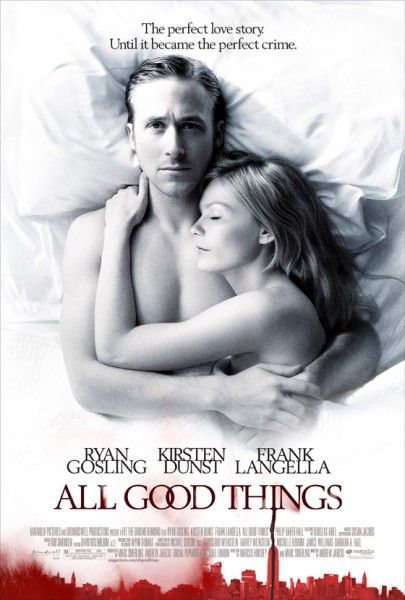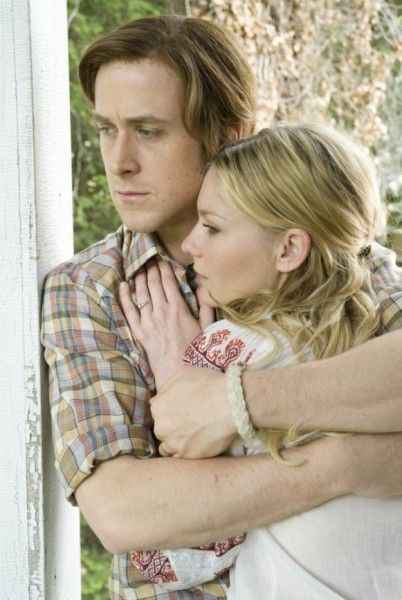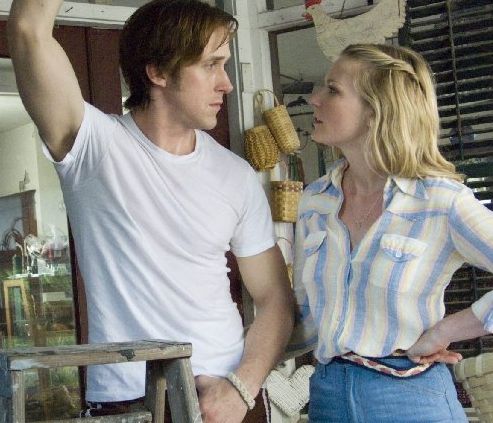The drama All Good Things, co-starring Ryan Gosling and Kirsten Dunst, was inspired by the events of the most notorious missing person’s case in New York history. Both a love story and murder mystery, the story of Robert Durst, of the wealthy real estate dynasty, was that of a man suspected of, but never tried for, the murder of his wife Kathie, who disappeared in 1982 and was never found. Renamed David Marks (Ryan Gosling) and Katie McCarthy (Kirsten Dunst) for the film, newly discovered facts, court records and speculation about the case and the circumstances surrounding it are the foundation for an imaginative and spellbinding story of family, obsession, love and loss.
During a roundtable interview at the film’s press day, actress Kirsten Dunst talked about her desire to make sure her character never came across as a victim, the experience of meeting some of the real woman’s family members and how difficult it was for co-star Ryan Gosling to play the more physically aggressive moments. She also talked about what it was like working with Lars Von Trier on Melancholia, said she’s looking forward to seeing what they do with the Spider-Man franchise since she’s a fan of Andrew Garfield, and mentioned that she’d be shooting her role in On The Road in a couple weeks. Check out what she had to say after the jump:
Question: When you do a movie like this, do you try not to have and opinion on whether this man murdered his wife or not?
KIRSTEN DUNST: I wanted to make sure I wasn’t a victim throughout the film. (Director) Andrew Jarecki and I really talked about that because he didn’t want me to bring in the shovel, but I had to go in there like I was going to kill him. That is how I wanted it to be. I don’t know what happened, but yes I think he probably killed his wife. Otherwise, the family would have helped find her. This big corporation with all this money helped her family, none whatsoever. It was their daughter-in-law. Why wouldn’t they help find her?
Did you do any research into this story, or did you feel that you really didn’t need to because it was just a movie?
DUNST: Well, part if the reason not a lot of people knew about it is because it got shoved under the rug. In terms of research, Andrew kind of did a documentary about everything that happened, so I saw that a year before we made the film. He had gone and researched and interviewed anyone who was willing to talk about what happened. I also met with Kathie’s brother, who is portrayed in the film, and I had dinner at the family’s house and everything.
What did the family say to you?
DUNST: It’s hard. They have lost their family member and they have never had the satisfaction of knowing anything. I think that they were relieved. There must be some closure to know that her story is getting out there again. I don’t know if the case could reopen. I don’t know what could happen. I know they were happy with me playing her. I basically just listened to them. They are the ones that this tragedy happened to. I didn’t ask too many questions.
What did they tell you about her, that wasn’t there on the page, that you wanted to carry over into your performance?
DUNST: I met what would have been her niece and they said she looks so much like the real Kathie who went missing. It’s difficult asking family members because all they said is that they love their sister, she way so bright and so beautiful, and she would light up a room. I think they are happy with my portrayal of her, but it was in the script. There were all these things about her going to medical school and trying to make whatever happened work. The way the script portrayed her and the way I played her, I just did not want her to be victimized at all. Every decision she made, you might think he made it for her, but I would turn that in my own mind because I didn’t want to play it in a way that women in the audience would be like, “Get out of there. What are you doing?”
Was it hard to get into this woman’s mind-set?
DUNST: It was hard with certain subject matters. I thought about the abortion scene a lot. It was something that his character decided. She was not going to have this baby. In my own way, I had to figure out how I could make it so that it could be my choice and I was not just succumbing under his rule. I just thought, “I wouldn’t want to bring a baby into this marriage, since it is really not going well. I am young enough. I can have another child with someone else, somewhere down the line. Maybe he is not ready, right now in his life. A lot of things have happened.” I tried not to cry and play it like, “Oh, poor me,” because that would be really boring. I didn’t want people to feel like, “Just leave and have your baby.” She also didn’t have the means, and it was a different time. She didn’t come from money and she couldn’t be a single mother so easily, like we have the option to now.
Would you have tried to get out of the relationship, if you had been in her situation?
DUNST: I don’t know. That was an enmeshment that was so strong. I think every woman goes through a relationship where she is with a guy that is really not right for her. You get lost in it. You can be in something that is not the greatest for you, but if you are at a point where you are married and you are already away from your family, with this money, living in Vermont, you’re isolated. I haven’t ever gotten to the point of enmeshment that I couldn’t see out of it.
What was it like working with Kristen Wiig?
DUNST: I loved her. Every time she came on set, we’d hang out in the trailer and just laugh. I remember once, we abducted Ryan’s dog and dressed him up, shot bunch of pictures and sent them back to Ryan over email with all these weird messages from his dog. I had the best time with her. It was a relief because it was such a heavy movie. To have her around was really, really fun.
Ryan didn’t stay in character the whole time you were filming, did he?
DUNST: I was also in my own world, and it was just the world we lived in. The only time I could see that it was really bothering him was in the scene when he rips me out of the room by my hair. We had a stunt guy who was like, “Get her by the roots, so that it doesn’t hurt as much,” but I also went with him, so it wasn’t like I was pulling against him or anything. But, he was so upset by doing that that he sent flowers the next day. That was hard for him.
Did working together come easy for you?
DUNST: We had eight weeks of rehearsal, but all we did was talk and talk. We had separate sessions with Andrew and we would talk about the people and their perspectives in the film, and how we could do it different. With different people, it could definitely have been a little cliché with the victimized wife. That is a dangerous ground to tread on. But, Ryan and I are pretty immersed when we are working, and not afraid to improvise together. We knew the people we were playing. We felt them, innately. It did not ever feel like anything phony or forced, in any way.
What kind of place are you in right now, with the roles you are choosing? You recently did a Lars Von Trier movie, and you’re doing On The Road next?
DUNST: I just did that movie with Lars over the summer. They were like, “You want to work with Lars von Trier?,” and I said, “Oh, yes please. Of, course.” I just want to work with great directors. I love Walter Salles. I am working with him for On The Road, and my part of that shoots in a couple weeks. I don’t have any plan. I am not like, “I only want to do serious films,” or something like that. I did Upside Down, over the Spring, which was romantic and fun.
Have you intentionally been working a lot?
DUNST: No. We shot All Good Things two years ago, and then I waited for a year and just read scripts. And then, I did Upside Down last Spring. Then, I had a couple months off in the summer. And then, I did Lars’ movie for two months. I’ve had off since September. I have a week of work for On The Road, but I have yet to find what I am doing next.
What is your role in On The Road?
DUNST: I am playing Carolyn Cassidy Camille, the role that is Camille in the book.
Were you a fan of the writing in On The Road?
DUNST: I was a fan of On The Road, but mostly because I had a crush on a guy when I was 15 or 16, so I read the book. The way it is written is so poetic, but is more of a masculine connection for a reader. I was more of a Silvia Plath fan.
What do you think of the change of direction in the Spider-Man franchise?
DUNST: I felt like what we had in those films was so special, with me and Tobey [Maguire] and Sam [Raimi]. It was such a unique experience because it was these independent minds and actors, making this huge film. It was great. All these kids are such huge fans, and to be a part of a movie like that is very special, especially a good franchise. So, to end on three, was the perfect way to leave it.
Didn’t a fourth film get close to happening, though?
DUNST: Yeah, but I also feel like it was time. They always want to push things for money reasons, and it didn’t come together the way they wanted or envisioned. I love Andrew Garfield so much as an actor, and Emma Stone, too. I think they we will be great in the new version.
Will you check the movie out?
DUNST: Of course. I’m going to see the movie, yeah.
Having grown up in the business, what do you like about it now, as opposed to when you were a kid?
DUNST: I think the way I work has changed. My style of working, what I do before I do a film and just being on a film set are different now. I just feel more free and fearless than I ever have been. Especially after working with Lars, I feel a sense of anything goes, really. Of course, you have to be in the right place emotionally, but he would film the rehearsal and just film us walking around the room, doing whatever we wanted to do, which could be scary for some people, but it was so exciting and opened up a whole new way of how things could work.
You did some cosplay for Murakami in Tokyo awhile back. What was that about and how did that come about?
DUNST: They just called me out of the blue and said, “Do you want to do this thing with Takashi Murakami?” I was like, “Sure, why not? I will be part of art.” It was scary doing that, though. It was freaky running around in that costume in Tokyo.

